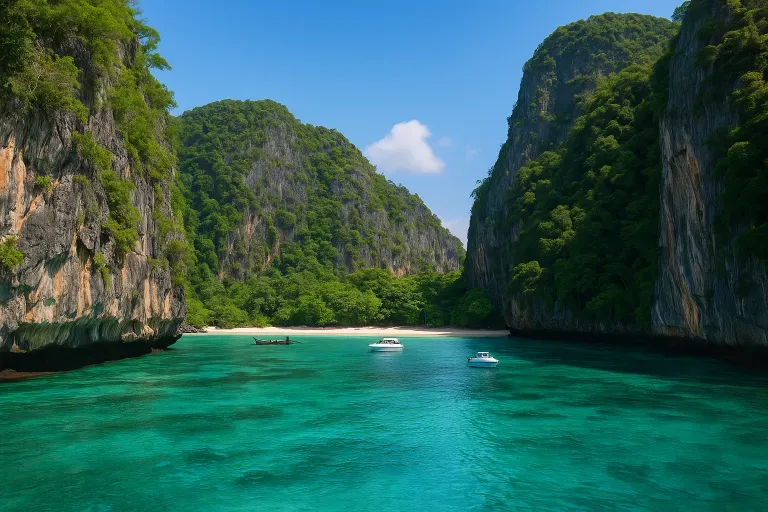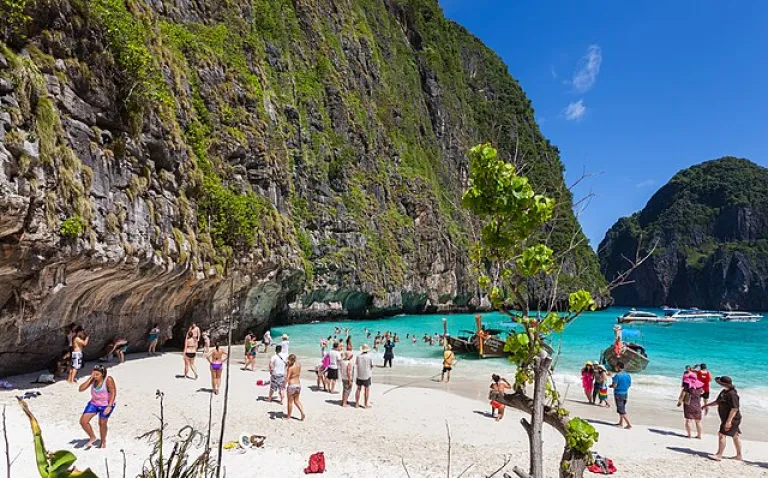Our favourite places to stay on this sleepy Cebu island.
Monkey Bay Thailand: What Filipino Travellers Should Know Before Travelling

Tucked away on the northern tip of Koh Phi Phi Don in Thailand, Monkey Bay is that kind of place you see on postcards and travel reels—turquoise water, dramatic limestone cliffs, and yes, actual monkeys hanging out on the shore. It’s a favourite stop for boat tours around the Phi Phi Islands, and it’s easy to see why. The bay feels wild, raw, and untouched—like you're stepping into a National Geographic set.
But not everything that glitters is travel-safe gold.
Also read: 10 Best Islands in Thailand for a Beach Getaway
Remember that viral infection story?
In April 2024, an Australian content creator named Angela Giakas made headlines (and racked up millions of views on Instagram) after she swam in Monkey Bay’s dreamy-looking water… and ended up in a Thai hospital just 16 hours later. Her symptoms hit fast: high fever, chills, body pain, and serious fatigue. She was later diagnosed with a bacterial infection that doctors suspected came from ingesting contaminated seawater.
Angela was treated with IV drips and antibiotics, but her post went viral because it hit a nerve—can something so beautiful really be dangerous?
One year later, does Monkey Bay still pose a risk?
Let’s get this out of the way: there's no official closure, travel ban, or confirmed outbreak linked to Monkey Bay. And thousands of tourists continue to swim and snorkel there without incident.
But Angela’s experience did highlight an uncomfortable truth: not all tropical waters are as clean as they look. Monkey Bay, like many popular spots in Southeast Asia, sees heavy tourist traffic. Think sunscreen, trash, fuel from boats, and yes—human waste runoff from nearby areas. When a place gets this much love, it can start to feel the effects.
The main concern? Bacterial contamination in the water, especially after heavy rainfall or during peak tourist season when water circulation isn’t great.
Should you still visit Monkey Bay?
Definitely—just be smart about it. Monkey Bay is still an incredible place to visit, especially if it’s your first time in the Phi Phi Islands. But Angela’s experience is a good reminder to travel with a bit more awareness.
Also read: Thailand Launches New Campaign Targetting ASEAN Travellers With Exclusive Perks
Things to keep in mind:
Don’t swallow seawater. It seems obvious, but when you’re snorkeling or swimming, it can happen without you realising.
Avoid swimming with open cuts or sensitive skin. Bacteria can sneak in through even the smallest wounds.
Rinse off after your swim. A quick shower helps wash off anything that could irritate your skin or cause infection.
Go during off-peak hours or seasons. Fewer people usually means cleaner water and a better experience overall.
The bottom line

Image credit: Diego Delso | Wikimedia commons
Tourists enjoying the turquoise waters of the Phi Phi Islands
Monkey Bay is still worth seeing for yourself—it’s beautiful, iconic, and full of that wild Thai island energy travellers fall in love with. But just like anywhere else in the world, nature needs a bit of respect and caution, especially when it’s as loved (and visited) as this spot.
If you’re headed to Thailand soon, don’t let one story stop you from diving in. Just go in informed, and you’ll be able to enjoy it the way it’s meant to be enjoyed: safely and fully.
Published at
About Author
Jeliefer Sumaya
Subscribe our Newsletter
Get our weekly tips and travel news!
Recommended Articles
10 Bantayan Island Resorts, Hotels, and Rentals for Your Tropical Escape 10 Best Mountain Cafes in the Philippines for Your Peak Coffee Experience Coffee date on the mountains, anyone?
10 Family Outing Ideas in Metro Manila Under ₱500 Looking for a weekend bonding with the family under ₱500? Head to these places, pronto!
10 Instagrammable Laguna Restaurants and Cafes You’ll Love Elevate your Insta-game at these Laguna spots.
10 Long Weekends in the Philippines in 2023 Book those flights ASAP.
Latest Articles
Best time to Visit Taiwan Based on Weather Seasonal travel guide to Taiwan
Viral 7-Eleven with Mayon Volcano View Now a Major Photo Spot in Bicol This 7-Eleven in Albay with the Mayon Volcano view is being hailed as the Philippines' version of Lawson and Mt. Fuji!
Complete Surigao City Travel Guide: Everything You Need to Know on Your First Visit Island life, mangroves, sunsets—Surigao’s got it all!
Papal Transition 2025: Reliable Tips For Filipino Travellers in Rome Witness history unfold in Rome during the 2025 papal transition.
Best Time To Visit Vietnam: A Month-by-Month Guide Plan the perfect trip by season

